
All categories
Featured selections
Trade Assurance
Buyer Central
Help Center
Get the app
Become a supplier

(19548 products available)

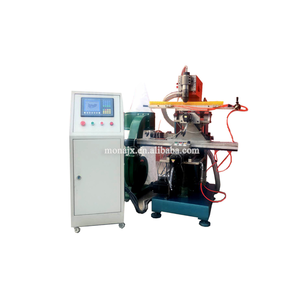



















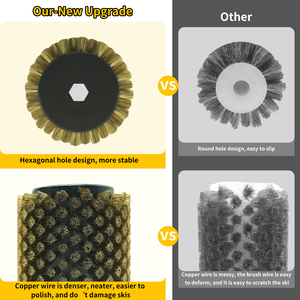
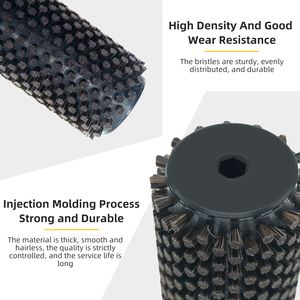
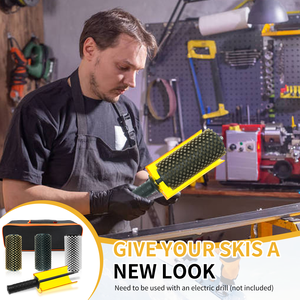



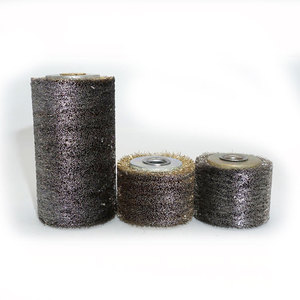
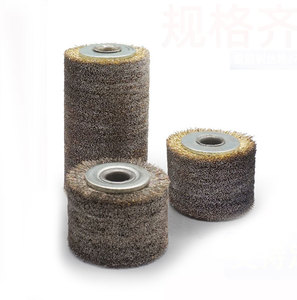
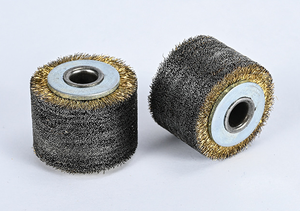


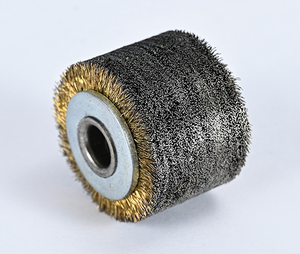
 Ready to Ship
Ready to Ship











Drill wire brushes come in various forms, each suitable for specific applications and surfaces. Businesses can cater to diverse customer needs by understanding these types.
Steel Wire Brushes
Steel wire drill brushes are perfect for tackling tough surfaces. They efficiently remove rust, paint, and heavy debris from metals. Their durability makes them suitable for outdoor equipment cleaning or metal structure maintenance. Because of their endurance, they are also used in construction industries that keep solid surfaces.
Brass Wire Brushes
Brass wire brushes are softer than steel, making them suitable for more delicate surfaces. They are designed to remove lighter rust or paint without scratching the surface underneath. This makes them ideal for cleaning aluminum, brass, or chrome parts. These brushes are especially helpful in the automotive sector, where sensitive components require attention.
Stainless Steel Wire Brushes
Stainless steel wire brushes combine the hardness of steel with corrosion resistance. They are well-suited for areas exposed to moisture or chemicals. These brushes effectively eliminate rust, paint, and deposits from metal surfaces. Thus, they find common applications in marine, chemical, and outdoor settings. This ensures that tools with high exposure to elements maintain their sturdiness over time.
Coated Brushes
Coated wire brushes incorporate nylon or other synthetics with steel or brass bristles. These are for light and medium-duty applications. The coated bristles reduce wear on surfaces and lessen brush clogging. These are ideal for electrical equipment or parts where minimal abrasion is crucial. They are also widely used in manufacturing to keep surfaces clean without damaging them.
Power Brushes
Power brushes are larger and more robust than ordinary wire brushes, designed for heavy-duty tasks. They attach to drill presses or power tools for intense cleaning, deburring, or surface prepping. Their size and strength make them suitable for industrial use or large-scale projects. Businesses will benefit from investing in these brushes as customers with significant tasks will need a more efficient solution.
Rust and Corrosion Removal
Wire cup brushes are vital in eliminating rust and corrosion from metal surfaces. They prepare these surfaces for painting, welding, or structural repair in various industries, including manufacturing, automotive, and maritime. Efficiently cleaning metal surfaces extends the lifespan of the materials, reducing maintenance costs for businesses. Hence, users rely on these brushes for consistent surface upkeep.
Surface Preparation
A drill wire brush is indispensable for surface preparation before applying protective coatings. They ensure proper adhesion in construction and protective finishes in the marine and automotive sectors. Businesses can enhance coating efficiency by delivering a clean and roughened surface. This leads to better product durability and performance.
Deburring and Edge Finishing
Wire brushes are commonly used to deburr metal edges in machining and fabrication. Removing sharp edges ensures safer products in the automotive and aerospace industries. Moreover, they provide a smoother finish, which is vital for components needing precise engineering. Hence, businesses benefit from better quality and safer products with these brushes.
Cleaning Mechanisms and Tools
Drill wire brushes effectively clean tools and equipment used in heavy-duty tasks. They remove built-up paint, rust, or debris, extending the life of the equipment. This is particularly beneficial in industrial facilities, workshops, and construction sites. Doing so saves time and money on equipment replacements. Users are also able to maintain efficiency during operations.
Surface Texturing and Finishing
In manufacturing, drill wire brushes are used for surface texturing and finishing. They create a uniform surface that improves the appearance and functionality of products. For instance, in the automotive industry, a specific texture enhances paint adhesion. Thus, wire brushes are crucial for achieving desired surface qualities. This keeps customers satisfied and maintains high standards for various end products.
Material Quality
Wire drill brushes are made of high-quality steel, brass, or stainless steel, which ensures durability. Steel wire brushes are best for heavy-duty tasks because of their toughness. On the other hand, brass wire brushes are softer and for delicate cleaning. Stainless steel brushes are ideal in wet or corrosive environments since they resist rust and corrosion.
Wire Gauge Thickness
Durable wire brushes have a thicker wire gauge. These allow for deeper cleaning without bending or breaking under pressure. A thicker gauge also ensures that the bristles wear out more slowly over time. Therefore, for rigorous commercial use, the wire's diameter is critical.
Tip Shape and Design
Strong and durable drill brush attachments for a drill usually come with rounded tips. This helps prevent damage to the surface being cleaned. Additionally, some brushes have a crimped design, which offers flexibility and better surface contact. Both these features ensure even wear on the bristles.
Type of Wire
Choosing a drill wire brush mainly depends on the material the wire is made from. Steel wires are ideal for surfaces that need heavy abrasion, such as hard metals, because they are tough and long-lasting. Brushed brass wires do well on softer metals like aluminium or plated surfaces. This is because they prevent scratches and damage. For areas exposed to water or chemicals, stainless steel is the best choice. It resists corrosion while maintaining strength.
Brush Size and Shape
For those with large areas or flat surfaces, larger wire brushes are suitable for great coverage. However, for tight spaces or intricate details, smaller brushes do the job well. Cup or wheel-shaped brushes work well on flat surfaces. In contrast, spike brushes are ideal for cleaning in narrow crevices or grooves in metalwork.
Angle of Attachment
One should also consider the attachment's angle to the drill. A higher angle, up to 90 degrees, offers better control for flat surfaces. Lower angles, around 30 to 45 degrees, provide flexibility in tight spaces but less stability. For a more versatile setup, adjustable angles allow for customisation based on the task.
Coating or Crimped Vs. Straight Wire
The type of wire one chooses also has its advantages. Crimped wires provide a longer-lasting surface because they wear evenly. They also give a more flexible surface. This flexibility enables the bristles to conform better to workpieces with irregular shapes. Straight wires give an even finish that is useful for surface preparation. A nylon coating reduces wear on the wires. It also reduces debris build-up between the wires. The coating protects the surface of items made of softer metals.
Grain Size
For each application, the wire's diameter or grain size is of utmost importance. For heavy tasks like rust or paint removal, go for wires with a larger diameter. Wires with a smaller diameter are for smaller jobs that require delicate work. The latter is for preventing surface damage on sensitive items like electrical components.
Wire brushes are not only for surfaces made of metal. They also work well on surfaces made of stone and wood. Wire brushes with stiff bristles are for removing concrete from surfaces. Softer brass or nylon brushes are suitable for cleaning wood. They polish the wood without scratches.
The most obvious sign that it's time to replace these brushes is diminished performance. Therefore, users have to check for signs of wear. These include bristles that are missing, shortened ones, or bent wires. Surface contact becomes uneven with worn-out brushes. Consequently, the cleaning will be less effective. In cups or wheels, built-up material can limit function. In some instances, the wire may even snap during use.
Although angle grinders have more power for heavy tasks, wire brushes attached to drills still offer efficiency. They are ideal for light cleaning, detailing, and reaching tight spaces. Angle grinder wire brushes are larger and more powerful. They are ideal for bigger jobs, like prepping a large metal surface or cleaning a big area.
A drill wire brush removes loose paint, rust, debris, and corrosion. It prepares surfaces to accept layers of paint, especially on metal. A wire brush also creates texture on woodwork. This enables paint to adhere better by giving it something to grasp.